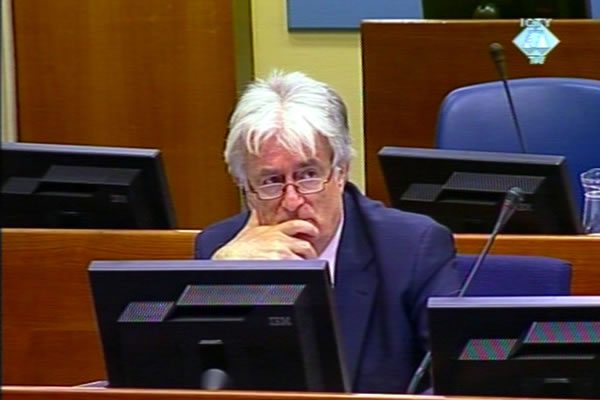Home
KARADZIC’S MOTION DISMISSED
The judges rejected Radovan Karadzic’s motion to compel the prosecution to obtain and give him the testimony of all the witnesses who had testified at war crimes trials before local courts in Serbia, Croatia and BH. The judges concluded that the accused – instead of trying to collect the necessary materials himself – wanted the prosecution to do his job and conduct an investigation in his stead
 Radovan Karadzic in the courtroom
Radovan Karadzic in the courtroom The Trial Chamber with Korean judge O-Gon Kwon presiding rejected Radovan Karadzic’s motion to compel the prosecution to obtain and give to him all the previous testimony of all the prosecution witnesses in various war crime cases before local courts in Serbia, Croatia and BH.
In November 2010, Karadzic asked the Trial Chamber to order the prosecution to interview all its witnesses and to learn from them when, where and in what courts they had previously testified. Karadzic wanted the prosecution to send requests to local authorities for the materials and then to relay them to the defense.
Dismissing the motion, the judges concluded that Karadzic did not try to gather the evidence he needed himself, but tried to get the prosecution to conduct an investigation in his stead. Encouraging the cooperation between the parties in the process of gathering materials, the judges noted that the accused had the right to ask the Trial Chamber for assistance only when he was not able to collect the documents on his own.
As Karadzic argued in his motion, if he didn’t get an adequate reply from Serbian, Croatian and BH authorities regarding the disclosure of the requested documents, he would ask the Trial Chamber to subpoena them, indicating that the procedure might take a long time.
As the Trial Chamber recalled, such motions must pass ‘a strict necessity test’. The judges advised Karadzic to focus his strength and resources on making ‘reasonable requests’ for materials he really needed. Also, the judges went on, ‘it is not in the interest of the accused to increase the already quite voluminous case file by adding documents of marginal importance’.
In his motion, Karadzic argued that if the defense asked for the disclosure of the evidence, there would be ‘an increased risk of the dissemination of the names of protected prosecution witnesses to broader circles in local courts’: the Trial Chamber therefore in its latest decision recalled that the accused and the members of his defense team were under an obligation to keep secret the identities of protected witnesses, just as the prosecution is.
Linked Reports
- Case : Karadzic
- 2010-12-16 KARADZIC NOT CONVINCED ABOUT AUTHENTICITY OF PROSTHETIC LIMB FROM MARKALE
- 2010-12-15 WHO DENIGRATED RADOVAN KARADZIC
- 2010-12-14 CITIZENS OF SARAJEVO ‘TRAPPED BY WAR’
- 2011-01-13 ETHNIC CLEANSING AND HEARTLESS DAY IN SARAJEVO
- 2011-01-14 KARADZIC: ‘SARAJEVO WAS BESIEGED FROM THE INSIDE’
- 2011-01-17 KARADZIC ASKS FOR ANOTHER THREE-MONTH BREAK
